Training > Websites | Tags: affiliate, websites, list building, sales letters
Presenting: my 6 most profitable websites - based on 14 years & $20 million in sales!
These websites ALL make money in 2019 - for affiliates, product owners, list builders & Internet marketers..
ALL of these websites have made me between $10,000 to well over $10 million...
Now, a few quick points - before we dive in...
I know you're sceptical...
So here's what's possible with just 2 of these websites - this month
(all recent proof & my affiliate commissions - my product sales are higher):
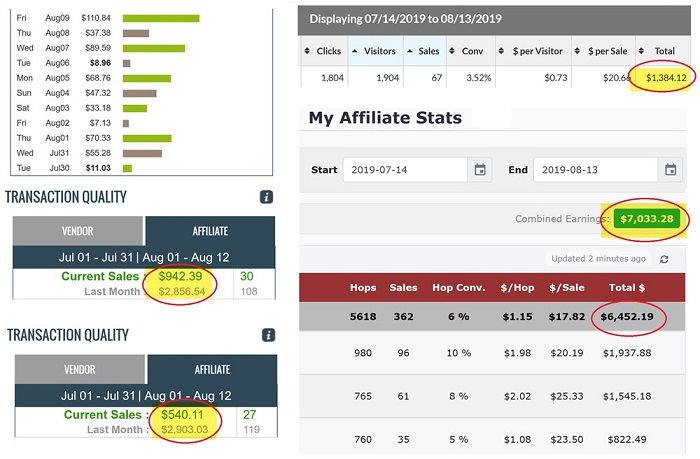
~
If you prefer, you can watch the video version of the article here...
~
So let's dive in...
~
~
Still here?
GOOD!
Because, what I REALLY suggest is grab a drink, close the other browser tabs...
And start scrolling¬
This article covers "the 6 most profitable types of websites - for average people".
Based on...
• 1000+ websites I built
• $2 million+ I spent on ads
• 3 million+ leads, I subscribed - and...
More than $20+ million in sales I've made since 2005, as an affiliate & product creator.
OK, let's get started!
~
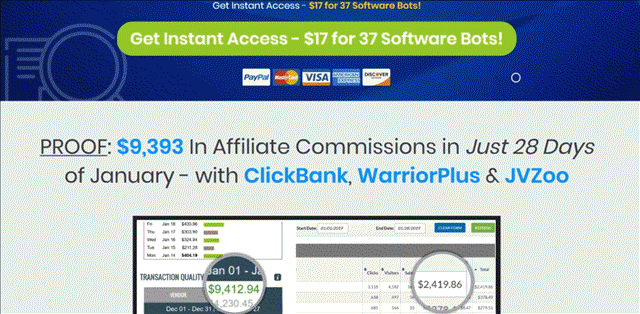
Let's start with a COLD HARD FACT:
After 10 years making money online & over $20 million in sales...
THE most profitable website I've EVER seen is a...
And the MOST PROFITABLE PRODUCT to sell on a "sales page" is a...
Digital/info product (not a physical/ecommerce product).
Seriously.
The sales letter is my MOST PROFITABLE TYPE OF WEBSITE ...by far!
It isn't even close.
This website has made me millions of dollars...
And it has been doing - for over a decade.
Take this single 9 hour period - from 2007:
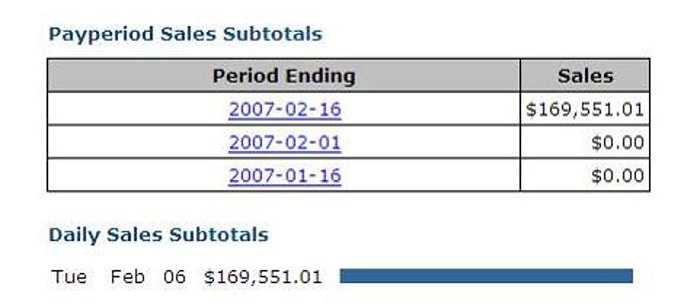
That was my best "one-day-profit" from a sales page -- from the original "DJK" offer on CB, back in 2007.
Since then, sales letters have become more graphical and visual (especially with the advent of video around 2008).
But the sales letter has consistently made me money - in all its forms.
And by the way, it's not just about short term profits...
The sales page (both "long copy sales letter" and "1 page VSL") has not only made me cash money...
It has also given me hundreds of thousands of CUSTOMERS, that I added to my buyers list:
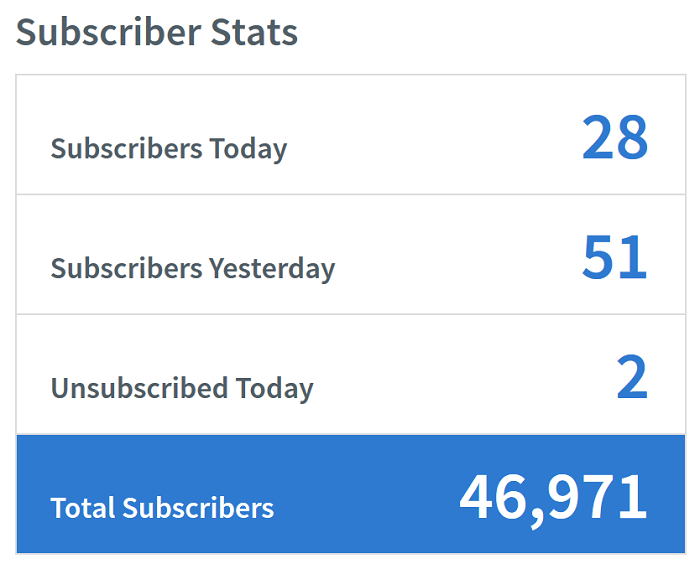
This buyers list I get from my sales letters, in turn lets me promote products as an affiliate.
And of course sell more of my own products to the customer list.
So these type of sales page websites aren't just "aggressive short-term revenue-generators"...
In the right hands, they are the bedrock of a long-term sustainable business too.
But that's only part of the formula...
These sales letters are perfect to sell digital products - ie. eBooks & software.
And the reason is simple:
Sales letters get very high visitor value ("EPC" or "earnings per click).
Why do these sales letters convert so well? Because...
There are no distractions on the page - no links to click, no content, no ads...
Nowhere to click other than the buy button.
You scroll down and buy - or you click back and leave.
Either buy... or bounce.
That's why these "sales letter" designs are so commonly used to sell digital products (ebooks and software) on affiliate networks like ClickBank, JVZoo & WarriorPlus.
Just look at the top 10 (by gravity), across all of ClickBank, as shown by my ClickBank Affiliate Software:
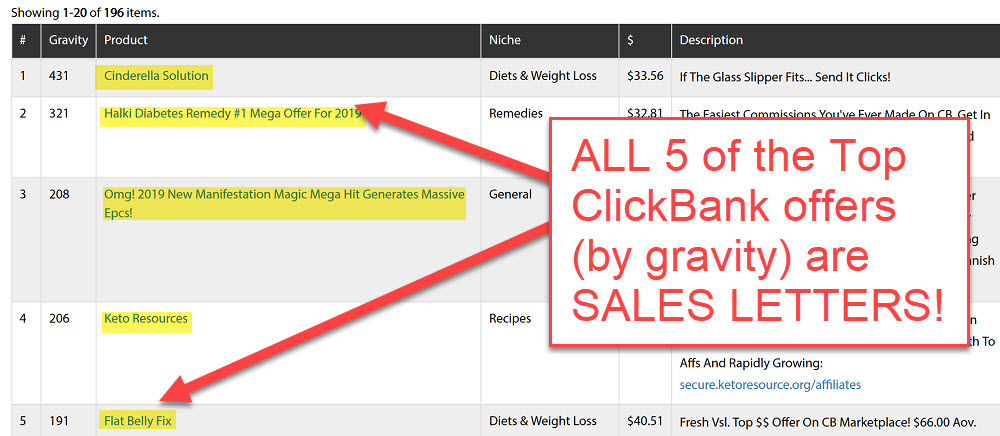
All these products are sold with a "1 page sales letter".
The combination of sales letter + digital product is especially powerful, because the margins are so high.
It's not hard to make a full time living, selling a $47 software, at 90% profit margins!
To see what I mean, check out the income calculator over on my Day Job Killer site and play with the numbers.
To hit an annual income of $50,000, selling a $47 product, we only need to sell 3 products per day:
Sounds impossible?
Not at all...
That means we only need 100 targeted visitors a day to hit our income goal and quit our job.
Quitting your job from 100 visitors?
YES.
It might sound impossible.
But it's very much possible, selling digital products using a sales letter.
Now, there's a whole range of factors at play here to actually generate a full-time living with info products (all discussed in my Day Job Killer course), but these numbers are not out of the stratosphere.
They're well within reach -just a few inches above where you are right now...
Now your next question might be:
Well, the sales letter comes preloaded with its own answer for that too:
Because sales letters convert so well ("high EPCs"), affiliates love promoting them - it makes them lots of commissions.
That means, you can list your product on an affiliate network, such is ClickBank, JVZoo, WarriorPlus, and affiliates will passively promote your sites.
And remember, with affiliates, you only pay them when they make a sale.
So you can earn zero-risk, passive income - as affiliates promote your offer, send you traffic & build your list.
Sounds like hype? It's not.
In fact over 70% of my traffic still comes from listing my offers on affiliate networks like ClickBank and JVZoo.
Just take a look at this screenshot:
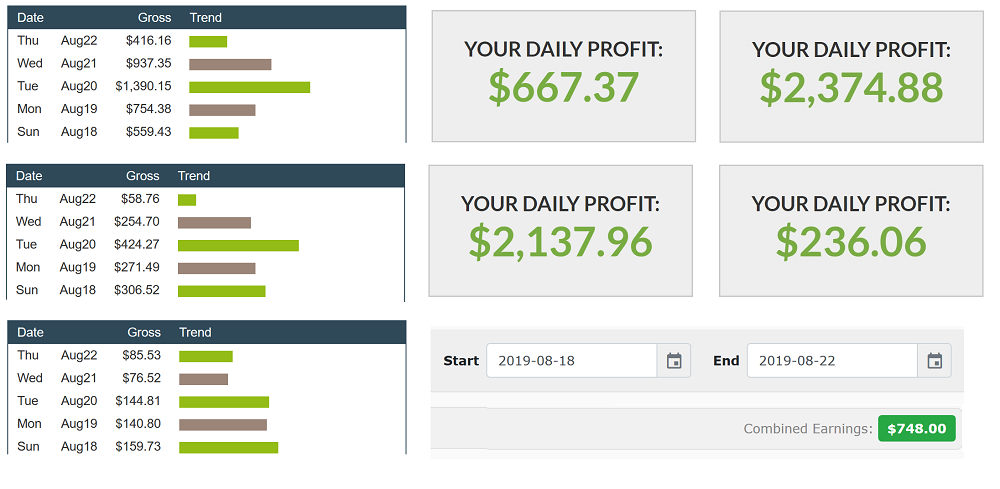
Of the 9 days shown, 5 of them had affiliates sending more than half the profits.
And the other 4 were indirectly down to affiliates sending me buyers... which I then funnelled through my own offers.
Provided you get the right offer (quality product in a good niche that converts) affiliates will send you the traffic.
Are you starting to see why the sales letter has taken my top spot?
Oh, and by the way...
If you do decide to create a digital product and sell using on a sales letter, then I definitely recommend you use a "funnel".
A funnel offers customers "optional upsells", after they purchase the front-end offer.
This boosts your EPC, increases your value per customer, makes you more money... and a "deep funnel" will also encourage affiliates to promote you.
Let me give you an example of a strong upsell funnel on JVZoo. Check out the funnel stats for My "Affiliate Titan" product which is the 13th all time selling offer on JVZoo.
The secret to this success? A great product, at a cheap price, with a strong upsell funnel:
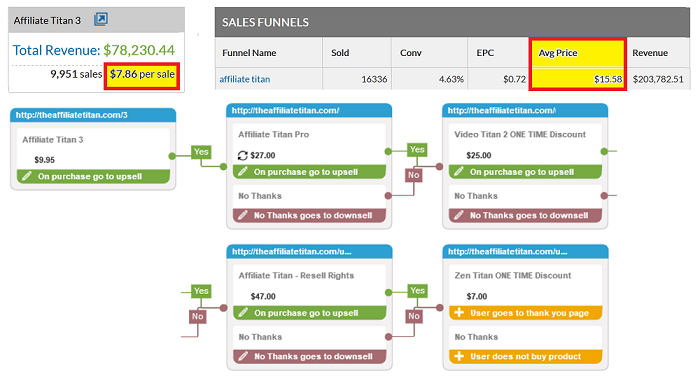
As you can see, the frontend has generated about $78,000 with an average price of around $7 per sale.
Mmmm... Not bad... #
But the upsells double the customer value up to $15 per sale, which has resulted in a much higher revenues.
Instead of a gross revenue of $78,000, with upsells wellover $203,000 in revenue was generated.
And yes, for this product, well over 80% of the sales came from affiliates.
So affiliates really do like promoting the products with a strong upsell.
I've talked a lot about the power of the sales letter, and why it's so deadly when used to sell a digital product.
But before we move onto my #2, let me make one last point...
CONCLUSION: If you do decide to sell your own products using the sales letter then I highly recommend you check out my Day Job Killer Course:
There's 8 software tools, over 50 training videos and a whole lot more. Click here to check out DJK.
Presenting: the squeeze page...
The squeeze page is also often called a "landing page".
This is basically a website that builds your list.
You can see the basic idea here:

Here's how the squeeze pages...
People hit a page with nothing on it but an "offer" and a "signup form".
They enter their email (and maybe name too) into a signup form - and in return they are given some kind of free bonus.
It's called a squeeze page because you literally "squeeze" the email address out of the person.
And, like the sales letter, they have 2 choices - either take action (enter their email) or bounce off the page.
NOTE: are you starting to see a trend here? The most profitable webpages focus the visitor on a particular action, and remove any distractions: either buy or bounce. Build my list, or bye bye.
So the squeeze page is basically a website that collects leads - so you build a list.
Now let's look at what we will need to actually build our list.
• First, we need to bribe them with some kind of "freebie" (or "lead magnet") to get them to join our list.
And of course, the higher the value of the offer, the higher your conversion rates will be.
For this reason I recommend either a free report or (ideally) a custom software tool. I discuss creating software below (see #5 - software-as-a-website).
• Secondly, if you want to build an email list, you will need an autoresponder software to actually handle the technical side of subscribing people, sending emails etc.
And that's where an "autoresponder" software such as AWeber or GetResponse comes in.

These autoresponders allow us to send email "broadcasts" to all our leads whenever we want, just like the above screenshot.
Moreover, autoresponder software allows us to queue up an "email followup sequence" - which sends out emails every day after the subscriber joined.
That means we can gradually build a relationship - and also sell to the lead over the coming days and weeks. And we do it on autopilot ;-)
Tip: followup sequences are very powerful, but be sure to mix content with promotional email. It's good to start to monetize on day 1, but be careful not to hard-sell people all the way through your sequence - as they may well just unsubscribe.
What makes squeeze pages so powerful is that you're building an asset - a list you can build once... and then market to again and again.
But here's where things get interesting...
You probably think list only = email.
BUT... in 2019, email is NOT the only list-building game in town.
Actually, over the last 1-3 years, many savvy marketers are now moving away from email towards other types of lists - such as push notifications and retargeting.
Why? Because of inbox overload, ie this:
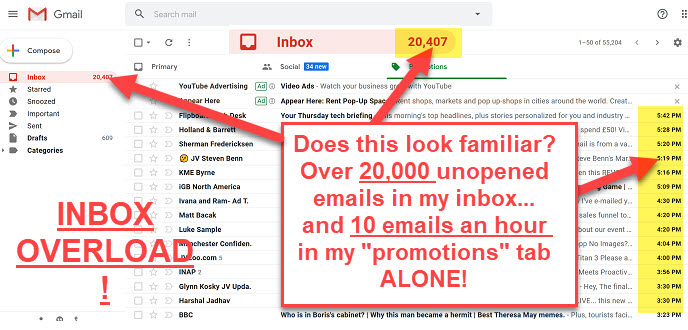
It's hard to stand out in an inbox like this, and...
The shrinking "inbox real estate" = lower clicks + lower open rates in 2019.
That's why I'm shifting my distribution AWAY from email in 2019.
And that's why I've built my own push notification software, which you can check out by hitting the link here:
(NOTE: I open and close this at regular intervals so it might not be "open" when you check it out... if so, hit the invite link and check back soon).
I suggest you check out my PushPro tool above, start to build retargeting audiences, and of course build a list - whether it's email or push.
But whatever you do: start building a list today.
Chances are, someone told you to build a list last week, last month... last year.
If you had done it, way back when... you would be a full-time marketer by now.
All these are great ideas, and there's no such thing as a bad list...
Just remember, that email isn't the only list-building game in town.
That's true in 2019, and it will be even more true in 2029.
So look at some of these other avenues when it comes to building your lists, audiences & distribution.
OK, onwards...
My 3rd most profitable website is the content website.
This isn't necessarily the site that's made me the most money.
Truth be told, maybe 2-5% of my all-time revenue ($xxx,xxx, in revenue) comes from content.
"Mid six figures" might sound like a lot, but over 14 years, revenue-wise, it's almost a rounding error.
However, this may turn into the deepest section of the article - and with good reason:
First, content sites are the easiest for most people to setup, since it requires minimal techie stuff.
And yes, I am writing this to the average person, not the grizzled veteran.
Secondly, content sites are the most common type of website online (WordPress powers close to 30% of all websites).
30%!
Also, while I might have - possibly, maybe - barely scratched seven figures with my content sites over a decade (that's less than $30 a day)...
There are monster sites like Huffington Post, DailyMail, TechCrunch, etc pushing eight-nine figures with content.
So I had to include it high up on the list.
FACT: Most "content sites" may not push $1 EPCs like sales pages & squeeze pages, but it's the first site we all set up. So it requires a very deep dive.
So grab your scuba gear, and let's dive right in...
Content could mean an article or video.
And content sites are often blogs, powered by WordPress.
So Content Sites are often WordPress sites, filled with articles/videos.
The free content you make attracts free traffic - from Google SEO, Facebook Organic Traffic, etc.
So in theory, if you write good content, the traffic will come, and you can become a full-time blogger.
These content sites also have a clear structure.
They often have a nav bar which loads up different sub-sections ("categories") of content:

Now... I'm obviously a marketer.
So let's take this "content nav bar" ...
And re-structure it in a monetizable way (note the mix of "content" and monetization):
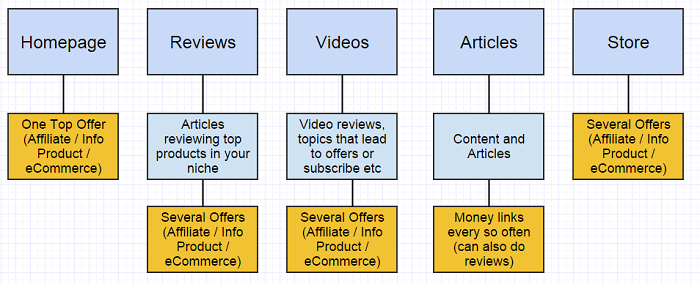
You'll see "content sites" like this everywhere.
And that's for one simple reason...
To launch your content site, all you need is a domain name, a free copy of WordPress & a cheap web hosting package.
Plus, the time to write content (or the cash to outsource the job to a site like iWriter - which can churn out unlimited, albeit mediocre, content for as low as $4 an article).
You then do a little bit of free promotion (via SEO), and monetize via Google AdSense and affiliate links.
You can even build your list from these sites (using popovers etc), and use the traffic you get to promote your own sales letters.
So these sites act as a natural starting point to lead into the even more profitable website types discussed earlier.
You need to walk before you can run...
At least... that's the idea.
However, a few points before you quit your job, in the expectation of becoming a full-time blogger...
Anyone can launch a quick blog. That's why my DoneForYou Website service starts at just a "$1 website/hosting/domain trial".
The harder part is taking that platform, and then actually creating sticky, shareable content.
Take this article you're reading.
It took me days to prepare, and hours to write.
I edited it twice three times four times many times. You get the idea.
More importantly, this contentleverages my 10 years of experience and millions of dollars in sales.
And make a note of all the links to my softwares and products, which matters because...
I'm not just writing content for the heck of it: I do it because I want to drive traffic to this site, engage deeper with my current buyers, build a bigger list... and sell my products via my sales letters.
So, you can see, even though I'm in the "content" game, that's only because I'm building my list and promoting my sales letters (see #1 and #2).
I'm wearing multiple hats, and my content hat is barely visible under the thick brim that says "direct marketer".
Also, I actually quite enjoy writing this content.
After all: if I didn't, I would just outsource it for $50, and have 100 mediocre articles on here instead of 10 very more complete ones.
Or outsource it to a really good writer - with knowledge of the topic - for $500... heck, even $2,000.
They would do a good job. But they wouldn't do "me".
Point is, you need to reflect deeply before you just "start a blog".
And either approach this as a mercenary business person, or dive feet-first into a niche you have a deep passion for.
In other words...
Either outsource content from day 1, or do it yourself.
But, if you do it yourself, only write about topics you enjoy and have an interest in.
And either way, whether you DIY or outsource... you MUST think strategically about why you're doing it, and what the long-term goal is.
It's easy to spend months creating content for no reason, and then one day you look up and say:
"what a waste of time! with hindsight, why would anyone want to become a blogger?"
Which brings me onto my next point...
And that really comes down to what you're selling.
If you're selling an autoresponder, write about things like "how to boost open email open rates", or "10 tips to choosing the best email autoresponder to you".
If you're a dentist in New York, choose titles like "how to choose the best dentist in new york" or "5 most common dental procedures in new york".
It might sound narrow-minded, but I've never seen someone waste their time by starting with a narrow lazer-focus on the consumer.
Think also about the path that your customer is on - from newbie to intermediate.
For example, a typical Internet marketing customer might start off with the general goal of "making money online", but with no ideas as to "how".
As they do more and more research, their searches start to refine and fill with clearer intent & more narrow keywords:
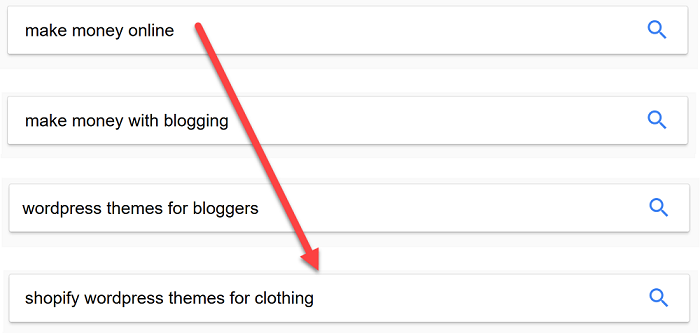
As these newbie>intermediate market gets deeper and deeper down the rabbit hole, their knowledge increases, making them savvy customers.
Savvy customers are harder to sell to... but more willing to buy higher priced, niche products - IF it solves the narrow problem they have encountered.
So reflect deeply on where your ideal customer falls on this newbie>advanced sequence.
Then, create content that matches not just the products you/your advertisers are selling... but also whether they are newbie, intermediate or expert.
Oh, and if you're thinking:
"I don't have any products to sell, I will just run some Google ads on my site, so I don't need to worry about all this"...
Well, you are wrong.
Even if you aren't selling anything, and plan to monetize your site with ads, you will definitely want to think about what your advertisers are going to be selling.
For example, compare the keyword "email autoresponder" to the keyword "build a list"
(compared by my top search marketing research tool, SEMRush):
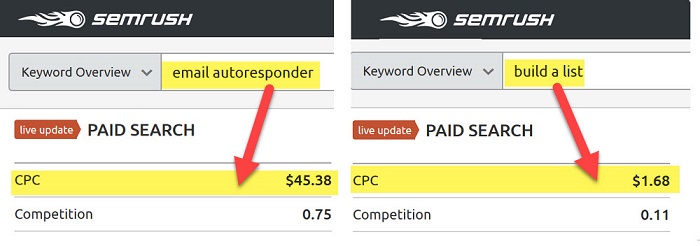
One pays $45 per click, the other $1.
Now you might not get $45 per click from AdSense ads, on your "email autoresponder" article, but...
Who would you prefer advertises on your site:
The guy paying $1 per click, or the guy paying $45?
It doesn't take many $45 clicks to make a full-time living from your blog, does it?
Now, I'm not advocating you stray from your "passion" and "knowledge".
But at the same time, it does pay to reflect deeply about your ideal customer.
And especially to reflect on who your ideal HIGH VALUE customer is.
Start with your "ideal high value customer", look at the products you/your advertisers are selling, and create content that solves their problems. It's much better to have 10 high value customers reading a relevant article, than 1,000 freebie-seekers bouncing off your site.
You can see I'm practicing what I preach.
All the content here relates closely to products I sell. That's partly because I create content about things I know about.
But it's also because I think deeply about what my typical customer looks like, what they're searching etc.
I could have outsourced this content, but I spent many hours deciding on what to write about, and then many more hours actually creating the content.
My goal is, anyone who ends up here, spends at least 5 minutes reading my article (and then hopefully clicks through and buys something).
The point is: when you create your content site, think "niche" and "quality". And make sure your niche is commercially valuable beforehand.
Think deeply about what your content should be about... and then split it up into sub-categories.
For example, a site about "building a list" might be divided into categories/ nav bar sections like:
Autoresponder Software | Email marketing | Push Notifications | Retargeting Audiences | Squeeze & Landing pages
NOTE: you'll notice in this example I'm using 2+ word categories like "autoresponder software". That's extreme, but it pays to really silo categories & make it clear that I'm gunning for very high value long-tail keywords.
So think deeply about monetizing -- and then divide your sites into different sections & pages - using the nav bar to divide these topics.
And then for each of these sections, fill your sites with banners, content, affiliate links, et cetera, that relate to that particular topic.
Your domain name is your brand, and it's what people see before they even click through to your website.
It also tells search engines like Google what your site is about, which means you rank higher for relevant keywords.
In an ideal world, you would use a 1-2 word domain that perfectly sums up your business, eg "autoresponder.com" or "autorespondersoftware.com".
However, with over 330 million domains registered, it's not easy to find one that's available.
For example, here's a one-word domain I sold back in 2013:
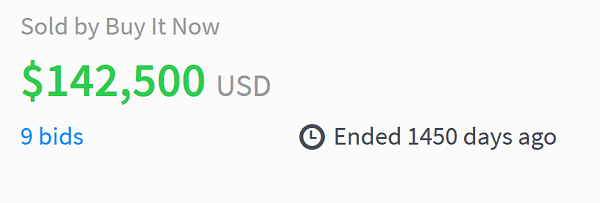
Not cheap, eh?
But there isn't a day that passes that I don't wish I still owned that name.
But cash flow is cash flow.
And ultra-premium domains are worth more than houses.
For the reason, I've largely moved away from buying pre-registered domains - just check out the 1,000 domains in my NameCheap as proof:

As you can imagine, with 1,000+ domains, you do need to develop somewhat of a formula.
So here's mine.
For example:
• autoresponder + madness = autorespondermadness.com
• affiliate + boss = affiliateboss.com
• bodybuilding + exposed = bodybuildingexposed.com
I haven't checked if these are registered, but you get the idea.
Note, how the first word sums up my niche (and the keyword probably helps with SEO), while the second word "brands my site" (and lets me find a domain that is actually available!)
If you're convinced by my "2-word-domain" logic, then...
Recommended: I highly recommend you check out my free Domainaveli software tool to find available premium domains.
With over 100 domain-name searches run in 1 click - for a range of popular website types:
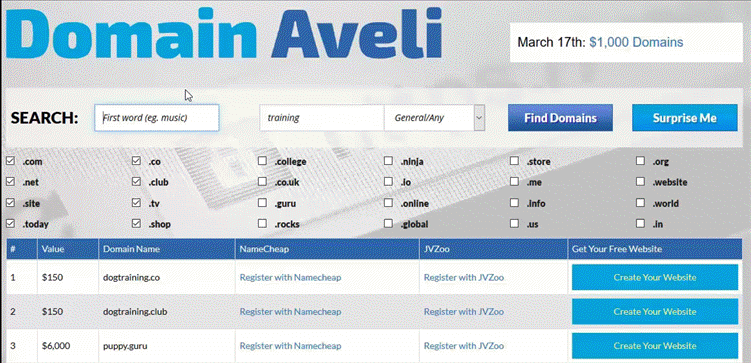
Still, not finding anything available?
If you're really in a bind, you can also look for expired domains, using my Dropaveli tool.
Dropaveli is part of the ProClub software suite (ProClub Membership gives you over 30 tools for just $1 today, by the way - it's not available on the ProClub site ironically enough. But since you read this far, I'll drop the link here ;-) Enjoy):
One last tip about content sites.
I suggest you embed videos inside your articles (just like I've done here).
Adding videos lowers bounce rates and keeps visitors engaged, which means any you're more likely to hold onto any SEO rankings you get.
Beyond that though, the video medium builds a deeper relationship with visitors as they get to hear your voice.
Voice is a key "non-verbal" communication, which builds a connection and relationship.
And relationship-building means visitors are more likely to signup/buy from you..
Again, I'm taking my own medicine - and have embedded a video inside this article.
RECOMMENDATION: We've waxed lyrical about content sites.
You might be in love with the idea, and ready to take action.
So, time for a quick recommendation.
In 2018, I built a website-building platform - powered by a custom WordPress theme - which allows anyone to launch these types of content websites.
And I call it the Done For You Website. Check out the breakdown here:
If you're a newbie looking to get started, and don't have time to action content/domain names/hosting/niche selection, D4U Website is a great option.
It's been built from the ground up for for both ranking/getting traffic... and also (very importantly) for monetizing that traffic too.
RECOMMENDATION #2: Maybe you're more interested in free content and Amazon than just owning a single content website?
Do you like the idea of creating spun content, and being an Amazon affiliate?
If so, then check out my AI affiliate software, which is not just a "website builder" but much more (video creation + article spinner + voice-over creator + review site builder +... etc etc)
OK you get the idea... check out AI Affiliate here:
OK...
We spent a long time talking about content websites.
But now it's time to leave the world of "most websites" and focus on:
Websites that actually make us some freakin moula!
Presenting my 4th choice, for most profitable sites...
OK, my 4th most profitable website... is a bit of a weird one.
Clone, and rebuild any website... that's making money for someone else?
Huh?
OK, I know this sounds kind of vague, but let me explain...
Firstly, let's start with this screenshot:

This is a screenshot from the website Flippa of a domain I sold a few years ago for $142,000.
Now there are millions of dollars changing hands like this on Flippa every year.
But... Flippa is not just about domains.
You can also buy and sell websites on Flippa.
And here's where things get very interesting...
And many of the sites are established, sites already making daily money.
And of course, to sell these sites to people like us, people need to divulge information, like:
• what niche their website is in (it might not be the niche you think)
• how they are monetizing their site (ads, affiliate income, selling a product)
• where their traffic is coming from (and in particular where their buyers come from)
It kind of is.
So what we want to do is to look on Flippa for ideas, websites, niche markets that are working for people.
And that then gives us, ahem, *inspiration* for our own Internet marketing moves.
So, simply head over to Flippa and click on established sites:
On the left hand side, you'll see that we can filter by monthly profits.
You can play with the numbers, but I like $500/month as a threshold for what's worth my time...
So right now, there are over 400 websites currently generating between $500 to well over $20,000 per month:
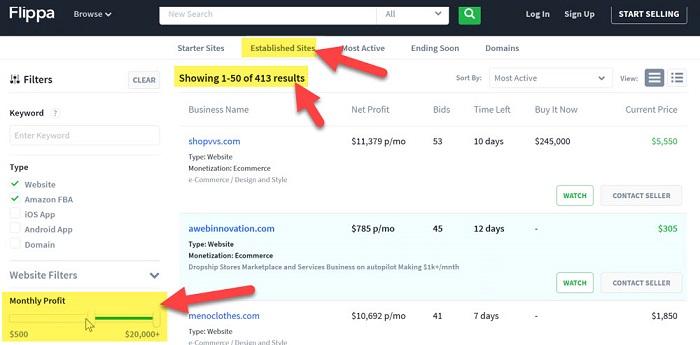
Don't be afraid to click on these links.
Click on all of them.
Keep clicking.
Very often these listings will tell you exactly where they get their traffic from, what type of product they sell...
And any issues that they face in the industry (dig deep into these posts, there is deep intel inside).
If this data still isn't enough for you, we can even supplement the information on the Flippa listing.
All you need to do is take the domain from Flippa, and run it throughcompetitive intelligence tools such as SimilarWeb or SEMrush.
Check out the video at the top of the page (about 11 minutes in) for me doing a bit of snooping on SEMRush and SimilarWeb for a site that's generating $11k/month from 50k visitors.
Tip: SEMRush Pro is well worth the $99/month they charge for a huge amount of competitive intelligence. SimilarWeb has even more data (I'd be fascinated to know who they partnered with to get it - a major browser or Putin perhaps? But SimilarWeb is closer to $5-10k/year for their basic plan)
Anyways, you can get a really good idea of how people are making money in many different niches on Flippa. It's basically a topography of Internet profits around the world...
Tip: Sometimes you will read the Flippa listing, and go "eh...what?! You won't "get" a particular method (CPA.. Amazon FBA... native advertising), the traffic source they using, how you can do it yourself, etc. If that happens, you can often find courses and tools for these different traffic methods on JVZoo and WarriorPlus.
Now, one final point about Flippa - it's a very cool marketplace that also happens to be a competitive intelligence goldmine - and not the other way around.
As I've mentioned, I've bought and sold domains on sites before on Flippa - for as much as six figures.
So do consider using it for its actual purpose - buying and selling websites and domains.
BONUS PLUG: Now I am quite obsessed with competitive intelligence, which is one of the reasons that I've actually built what I do believe is one of the most powerful competitive intelligence tools - Keywordaveli, which is one of the tools inside of DayJobKiller:
Keywordaveli lets you build up a buyers list of "perfect buyer keywords" using your competitors on SEO and PPC. It's a technology I first built back in 2007, and I still can't believe no-one else has replicated it. So, if you're interested in finding your "perfect buyer keywords", check it out on the Keywordaveli demo, on the DayJobKiller page.
~
Sheesh...
Deep breath.
OK, now this article is longer than I thought, and my fingers are almost bleeding.
But on closer inspection, it's actually the page that's bleeding money...
So let's keep on going...
Only 1 more profitable website to go!
Thought #4 was vaguely titled?
This one will really have you scratching your head.
But, it's made me over $300k, and no-one else knows it.
So let me explain how this type of profitable website works:
• This is a simple website that you can sell access to - at $10 to $100 a pop.
• It's a cloud based software - that people visit in their browser
• It's quickly built - from just a simple Microsoft Excel file (free)
• It's software you can sell, and without any programmers, PHP or SDKs.
It is real software, but without ANY of the usual headaches that come with building software.
And there are NO huge monthly invoices like this monthly invoice from my developers...

OK, so I know you're excited by the idea of:
1) creating software but
2) without the usual costs and headaches
Who wouldn't be, right?
So, let me give you an example you can check out right now:
The ProClub Internet Marketing Launches Page.
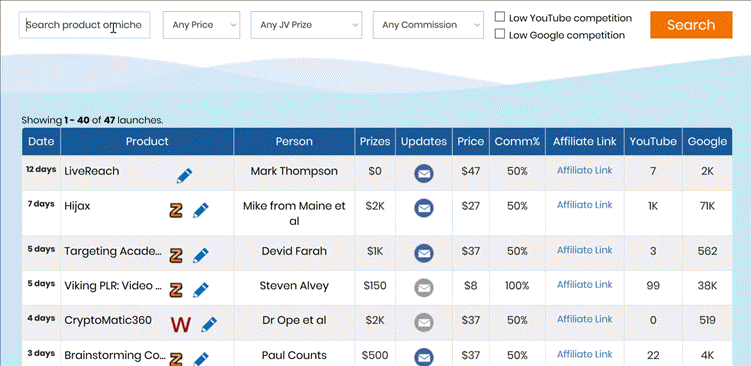
ProClub Launches.
It's a labour of love for me.
I used to sell this, as part of a software suite, which sold $xxx,xxx.
But then I removed the "paywall" - and give it away for free.
Why? To drive thousands of repeat visitors back to ProClub, each month:
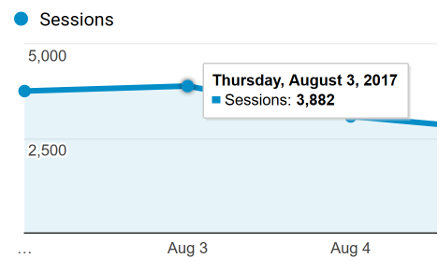
The thing is, when it's a "cloud-based software", a tool that anyone can access in their browser, it's easy to make the switch.
Sell it... give it away as a bonus... use it as a "lead magnet" ... or as "traffic bait".
It's your call how you leverage the awesomeness of server-based software.
And that brings me to the beauty of these types of tools...
Here's the thing you MUST understand:
Many of my top-selling tools are both a website, and a software.
The process goes like this:
1) I wrote a brief for my software developer ("let me add launches to an admin area that appear on my proclub website")
2) The developer creates the "backend admin" area, and the "frontend" interface that visitors see (at pro.club/launches)
3) Now every day, one of my staff adds new launches to a backend
4) These launches
then appear on the website "frontend". Since it's a website, you can access it like any other website.
There's more going on than just that, but it's basically a searchable database, that people can view in their browser.
You'll hear lots of industry types refer to this as techie B.S. like...
"SaaS... Software as a service... cloud-based tools.. B2B apps... server-based tech...etc"
But really it's just a software that people can load in their browser.
It exists on a server (just like any other website) and appears at www.yoursoftwarehere.com.
Now, here's the good news:
1) These types of "browser-based database softwares" are both very easy to build, and very profitable.
In fact, I've sold well over $300,000 of these one page database softwares in the last 6 years.
They were the bedrock for my biggest year on JVZoo.
Just look at me having the #1 product (left), crazy bars (middle) and huge recurring monthly passive dough (right):
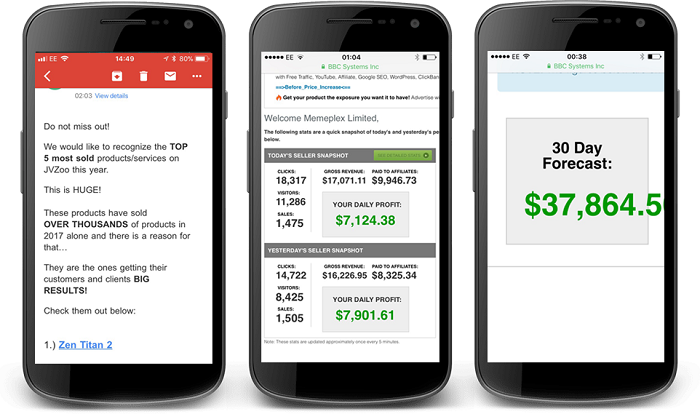
And, again, the bedrock of all this was...
CLOUD-BASED SOFTWARE.
And, don't worry...
The simplest way to build them is by using a "static backend database".
A sta-sta-what-what?..
I know, that sounds complicated, but really just means a Microsoft Excel (CSV) file that you upload once.
That's your database, done.
You can create this Excel file yourself, or hire someone on a site like Onlinejobs.ph to do it for you (I give my brief out inside DJK).
Then you import the CSV file once to create your backend, tell a software developer how you want it to appear, and then the data appears as a front end website, which is powered by the CSV.
You can also add some simple filter commands to allow people to search. and hey presto, you've basically created an instant software that you can sell on JVZoo, ClickBank, etc.
Here's another quick example - the Host Affiliate Bot, which is just a database of the top most profitable hosting affiliate programmes. You can see there's only 20 rows, there's only three columns. It's a very simple tool, built on a very simple database:
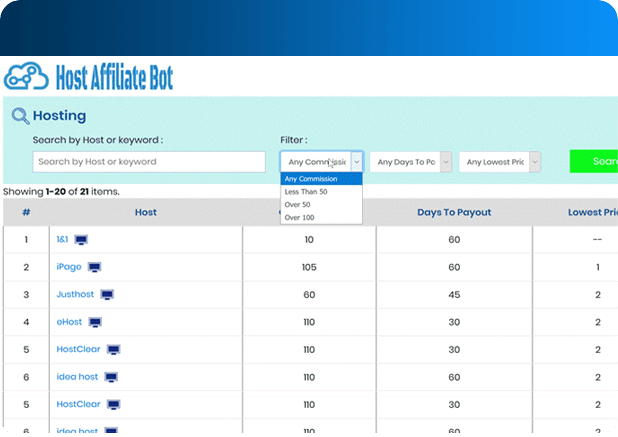
We've got these different filter options at the top, but all this is just a "reskinned" CSV file, which has been turned into a searchable front end using my "AI Software Generator" tool inside of DayJobKiller (here's the training video to show you how Software Generator works it's magic).
And yes these tools do sell: Hosting Bot is part of my Affiliate Bots suite, which has recently logged it's 10,000th sale.
Want to create software like this yourself? Then you need The Software Generator. The Software Generator lets you build your own self-hosted, password-protected, cloud-based software tools - just like my Hosting Affiliate Bot
All you need is a CSV file, and the tool will do the rest:
You know what, just let me drop my training guide for Software Generator right here, into this article:
You can get Software Generator exclusively as one tool within the DayJobKiller package here.
Like I say, all you need here is an idea like "the top 10 xxx", and you build a quick CSV around it, import it into the Software Generator... and now you have a website that you can sell access to.
Don't have any ideas? Don't even know what niche to sell this kind of software in?
Well, the fact that you're reading this tells me, you very probably understand that marketing space.
And in this one niche alone there are literally hundreds of sub-niches that you could create a database website software such as this.

I've sold "Database Website Softwares" like this for t-shirt marketers.. social media... affiliate marketers...
The possibilities are endless!
It's the 21st century.
And with the SOFTWARE GENERATOR, you have 22nd century technology - so start creating!
OK... one last site...
Last up, my 6th most profitable website to build:
The authority website.
I'm an average guy.
And that's why, my 5 picks previous have been sites average people can build.
But let's take a leap away from my laptop.
Let's dive into the world of Davos, Silicon Valley.
The world of robots, AI, and billionaires.
It's time to look at the authority site.
And let's start right at the top, with the big bad boss.
The #1 Alexa.
The Ultimate Authority site since 1997:
Google.
Reflect on the huge quarterly revenues, the eight-figure cash reserves...
Now, you will hear different definitions of what exactly an authority site is.
But I'm surprised that there is any contention here.
THERE IS ONLY ONE DEFINITION OF AN AUTHORITY SITE.
AND IT IS 100% SCIENTIFIC AND AS CLEAR AS DAY.
HERE GOES...
I define an authority site as:
A website that people return to - without you needing to promote it.
We can see this source of Google's dominance - with a quick bit of competitive intelligence research.
Let's head over to SimilarWeb and look at Google's DIRECT TRAFFIC:
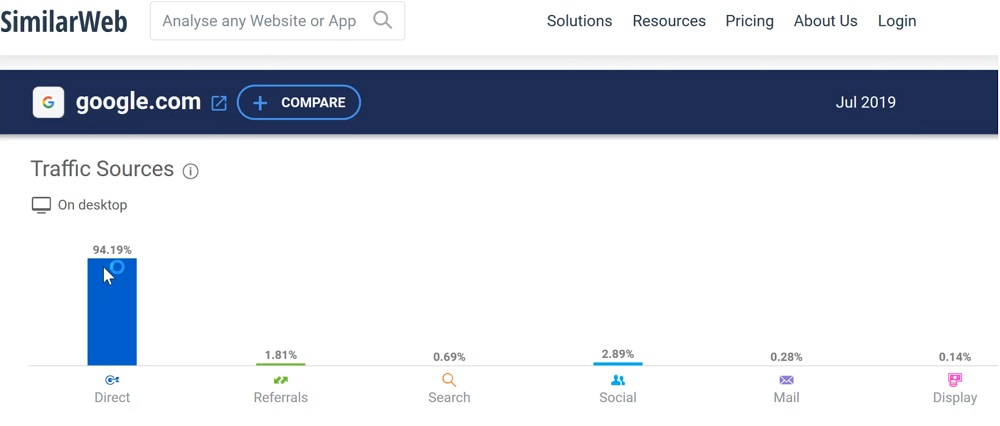
Note how 94% of Google visitors go to Google.com DIRECTLY.
No referrals, no social, no social, no clicks from email.
Either, they typed the website's address into their browser, searched a keyword in their address bar... or just have Google as their homepage.
It's all direct traffic - because people WANT to go to Google.
They don't need to click an ad, or get referred when your best friend shares it to their Facebook wall.
They just go because it's either their homepag , because they've typed something into the search bar...
Or because Google is simply the first website that they go to when they plug into the Intenet.
They go because they love Google, because Google adds value.
Now Google is of course an extreme example.
But follow my definition:
An authority site is a site that has high direct traffic...
And you can see that Google is very much an authority site.
Their direct traffic tells us that much.
So how exactly do you get authority?
Well, quite simply based on my definition:
You become an authority, by consistenly increasing your repeat and return visitors.
And how do you get repeat and return visitors?
By adding value so your visitors want to become repeat and return visitors.
Now "adding value" is a difficult one to describe, but depending on your particular niche, it could be...
• new content that you create,
• user generated content that other people write,
• a forum that's particular active,
• free software that people want to return to use (which is one of the ways I drive people to ProClub), or perhaps
• your own niche software tool or search engine people want to use daily.
Either way though...
Here's what makes the authority site special:
I equate authority (and direct traffic) with independence.
With repeat, return visitors, you don't need to worry about buying ads.
You can't care about whether your properly SEO optimized.
And you could care less about the latest algorithm tweak.
Having authority is the ultimate way to have continued revenue growth, and rising traffic, without needing to worry about "driving traffic".
In the future, people will just visit your site ...because they love your site.
As Bill & Ted put it - "just build it and they will come".
We can all learn from Google's example, and focus on creating quality websites people actually like.
Whether your aim is the Forbes list, or just making a part-time income from your blog, it's much easier to profit... if you're actually adding value.
Whichever website you decide to build, I suggest you start creating websites at the top of my list, and then work your way down.
I assume your goal is making a profit first, and I listed the sites in order of profitability.
So start building!
And start using the resources I provided.
Hopefully you can start small, eg. "generate a part-time income with a niche blog".
And then you can level up - "build my list, using push notifications and email".
And once you're an advanced affiliate, you can then: "create your first digital product with the Software Generator".
The sky is the limit, and the above 6 websites are literally making 9-10 figures every year.
There's never been a better time to be an entrepreneur!
So take action, level up -- and get moving.
LET'S DO THIS!
Oh, and...
Remember, these websites are listed in order of PROFITABILITY.
In 2019, these are the 6 most profitable websites you can build:
• #1 - Product Sales Page - Sales Letter with a VSL (Video Sales Letter)
• #2 - The Squeeze Page (AKA "Landing Page" or "Lead Page").
• #3: Content Website (ie - WordPress, SEO, Organic)
• #4 - Any Website... that's making money for someone else
• #5 Database Website - Cloud-Based Software That You Can Sell.
• #6: The Authority Site.
So, just to repeat, my conclusion is that the #1 most profitable website is a sales letter website, selling your own digital product.
And that brings me back to my DayJobKiller course, which is a summary of everything I know about creating & selling your own product, after more than a decade.
And $xx,xxxx,xxx in cash profit.
So, click here for a full walk-through of the basic steps to sell your own info product, along with a demo of all 8 software tools, and all 50+ training videos.
OK, thanks for reading! I'll see you in the next monster article ;-)
Cheers,
Chris
P.S. Want to dig a little deeper, before you take the plunge and build your first profitable website? Good shout...
Here's a list of all the tools I mention in the article:
• Day Job Killer - how to create & sell info products (8 software tools & 50+ training videos)
• PushPro - how to build a list with squeeze pages & push notifications (push autoresponder, with template messages, pre-made landing pages & training videos)
• SEMRush - awesome search marketing tool for PPC/SEO/display ads research. Limited free use, or $97 for Pro (or $397 for API access)
• SimilarWeb - monstrously accurate competitive intelligence tool. Good enough free account. Full access price? Only available on request (during frustrating sales call), but last time I checked was $7k/year for a basic plan. Data that would make Mark Zuckerberg sweat with a price only he can afford
• Domainaveli - my free domain name research tool, built for Internet marketers & affiliates
• Dropaveli - tool to find expired & dropped domain names. Exclusively part of my ProClub suite (30 tools for $1? I lost my mind. Take advantage with this $1 trial).
• Done For You Website - complete domain+hosting+website+wp theme+content+monetization solution for anyone looking to launch a content site or blog, but doesn't have time and money to do so
• AI Affiliate Bots - complete system for get YouTube buyer traffic & turn it into Amazon affiliate commissions. 6 software tools including video creator, website builder, AI voice-over creator, article spinner, doneforyou products & niches, keyword research & more.
• Flippa - very awesome marketplace for buying/selling domain names and websites. I sold a domain for $140k here once. Also an awesome source of competitive intelligence.
• Keywordaveli - the only tool that finds "perfect buyer keywords" by standing on your SEO & PPC competitors shoulders . Part of my DJK suite. Check out the training video on this link.
• JVZooMarketplace - customer-facing version of JVZoo's affiliate marketplace. Lots of software & training on a whole range of Internet marketing topics. Good for understanding more about (and automating) some of the business models you will unearth on Flippa
• Software Generator - the fastest way to create software, using nothing but a simple CSV. These types of tools have made me over $300k in sales. Wondering how a "cloud-based-database-software-thats-actually-a-website" makes $300k? Check out the training video here to see how it works.
Our main membership site, Instantly access 30 Internet marketing software tools.
Get Instant access!Our top-seller! 37 Softwares that change affiliate marketing...forever!
Get Instant access!Profit with your own product. 50+ training videos and 6 NEW softwares.
Get Instant access!Automate EVERY aspect of my $400,000/Year business, Including... Building Websites, Developing Software, Creating Brands & Getting Buyer Traffic
Want to quit your day job? Sell your own info products. With 50+ training videos & 8 softwares, this is the ultimate course (NOTE: I only offer a limited number of slots for this, so it may not be available right now)
